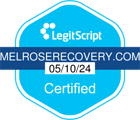Detox Treatment Program In Los Angeles, California
Detox is the essential first step in any proper rehab facility. It’s essential that your body be cleansed of any toxins prior to treatment. Throughout this process, our caring & trained staff provides close monitoring and compassionate care to ensure your treatment is effective and provides you with the best possible outcome.
Seamless Transition from Detox to Residential
Detox helps you to overcome physiological dependence. When your body no longer is convinced that it needs a drug just to survive, you’re ready to move on to residential.
Client-focused addiction treatment programs allow for a seamless transition from detox to residential. For example, you graduate from the detox center portion of the treatment program and move to the rehab phase immediately. Detox and rehab both take place in a residential treatment setting, which cuts down on inconvenience for the clients.

Support Through Withdrawal
At Melrose Recovery, we provide compassionate and structured support for those undergoing withdrawal to ensure they are comfortable and supported throughout this crucial phase.
Each program is designed to manage symptoms safely and effectively, creating a strong foundation for recovery. Our offerings include:
- Alcohol Withdrawal: Our alcohol withdrawal program offers close medical supervision to manage symptoms, ensuring a safe transition from physical dependence to stability. We’re here to provide care and guidance every step of the way.
- Meth Withdrawal: The meth withdrawal program is tailored to support you through this difficult process with compassionate care and medical attention, helping ease symptoms and prepare for the next phase of treatment.
With the right support through withdrawal, you can transition seamlessly from detox to residential treatment, beginning their journey toward lasting recovery.

Find Your Footing Again
- One-on-one talk therapy that encourages self-examination and identification of dysfunctions.
- Group therapy sessions with an eye on relapse prevention and disease education.
- Relaxation opportunities that may incorporate meditation.
- Exercise therapy that benefits individuals of all fitness levels to work on building physiological health.
- Social gatherings, which train you to relate to peers in a drug-free situation.









